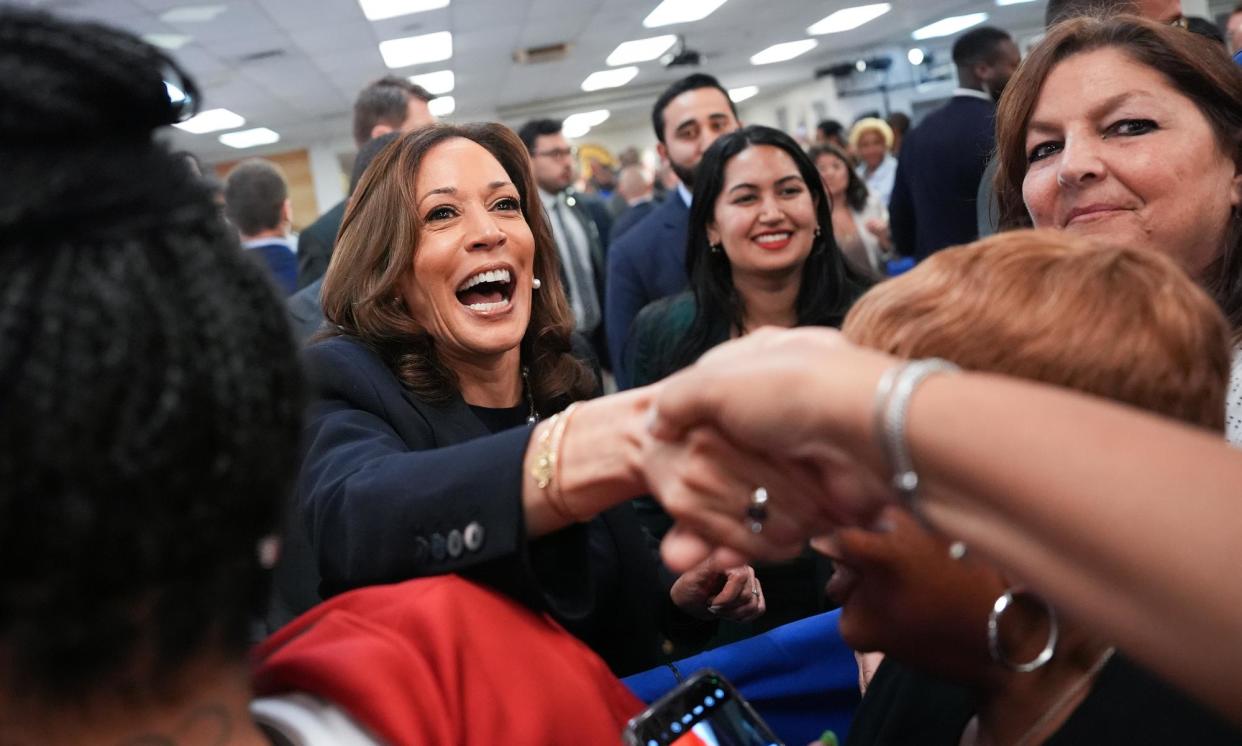Polls show Kamala Harris building lead over Trump in 2024 election

Kamala Harris continues to gain strength in the US presidential election, as polls nationally and in battleground states show her building leads or catching Donald Trump.
Related: Trump campaign struggles to lay a glove on surging Harris
On Friday morning, FiveThirtyEight, a leading polling analysis site, puts Harris, the Democratic party’s presumptive nominee for president, up by 2.1 points over her Republican rival in its national average.
In averages for swing states, where control of the White House rests, Harris led in Michigan by two points, Pennsylvania by 1.1 point and Wisconsin by 1.8 points. Trump led in Arizona by less than half a point and in Georgia by half a point.
In battleground states without enough polls to calculate averages, Trump was ahead by about three points in North Carolina and the candidates were about level in Nevada. In the latter state, recent CBS and Bloomberg polls have given Harris two-point leads while on Friday the Nevada Independent reported a poll showing the Democrat six points up.
The US vice-president, 59, has changed the election race since mid-July, when Joe Biden, 81, finally heeded calls from his own party to step aside for a younger candidate to take on Trump, who is 78. He endorsed Harris to take over the top of the Democratic ticket for this November, while he serves out his single term.
On Thursday night, Amy Walter, of the non-partisan Cook Political Report, told PBS that before Harris entered the race, Biden “was behind by a significant number, not just at the national popular vote, but in those … battleground states. You can see almost six points in a state like Georgia and Nevada.
“Now, just in the time that Harris has been in the race, you have seen those numbers move pretty significantly toward Harris, four- or five-point shifts in those battleground states, which is mirroring what we’re seeing in the national poll as well.
“It hasn’t turned those states, though, from ones that favored Trump to ones that now favor Harris. It just means now that the race is no longer as lopsided in Trump’s favor as it was, say, in late July … which is why we’re calling this race a toss-up.”
The same day, the Cook Political Report changed its ratings for three Sun belt swing states – Arizona, Georgia and Nevada – from “leans Republican” to “toss-up”.
Another analysis site, Sabato’s Crystal Ball, based at the University of Virginia, changed Georgia from leans Republican to toss-up. Looking north, the site changed Minnesota and New Hampshire, states where Trump made gains while Biden was top of the Democratic ticket, from leans Democratic to likely Democratic.
Harris’s choice for vice-president, Tim Walz, is governor of Minnesota. Any Walz effect on polling has not yet been felt but some observers expressed surprise that Harris passed over Josh Shapiro, the governor of Pennsylvania, a battleground state.
Others argued back. For Sabato’s Crystal Ball, Joel K Goldstein said that though Shapiro and Mark Kelly, the Arizona senator who was also closely considered, were “both from competitive states that were … important pieces of the 306 electoral votes Democrats won in 2020”, in choosing Walz, “Harris demonstrated yet again that vice-presidential selection turns on matters other than the over-hyped criterion of home-state advantage.
“Walz also had the most experience (17 and a half years) in traditional vice-presidential feeder positions (senator, governor, member of the House of Representatives, holder of high federal executive office) of her options, which contrasts with the very limited experience (one and a half years) of his Republican counterpart, Ohio senator JD Vance.”
Among widely noted individual polls, Harris led for a second week in the Economist/YouGov survey, maintaining a two-point advantage. Reuters/Ipsos found Harris up five points, 42%-37%, up two on the last such survey, taken just after Biden withdrew. Ipsos said it also found in a separate poll Harris leading Trump 42%-40% in the seven battleground states, though it “did not break out results for individual states”.
A national poll from Marquette University in Wisconsin showed Harris up six points, with 53% support among likely voters to 47% for Trump. Harris maintained that lead when other candidates were included. Robert F Kennedy Jr, the leading independent, took 6% support. In the Reuters/Ipsos poll, Kennedy’s support had fallen six points to 4% since July.
The Marquette poll contained further good news for Harris, pointing to her energizing effect as the campaign heads for the home stretch: an 11-point rise in respondents saying they were very enthusiastic about voting in November.
Related: Trump lashes out at Harris and falsely claims no one was killed on January 6
“Enthusiasm has increased substantially among Democrats, with a small increase among Republicans,” the Marquette pollster Charles Franklin wrote. “Republicans had a consistent enthusiasm advantage over Democrats in previous polls, but this has been mostly erased now.”
It was not all good news for Harris and Democrats. In a poll released on Thursday, CNBC put Trump up two points and firmly ahead on who voters thought would make them financially better off.
Micah Roberts of Public Opinion Strategies, a Republican pollster who worked on the survey with a Democratic counterpart, said the election was “less now a referendum on Trump than it is a head-to-head competition between the two candidates”.
Harris, Roberts said, was “still carrying a lot of water for the [Biden] administration. She has to answer for that and define herself independently … That’s a lot of baggage to carry when you’ve got a compressed time frame against a mature campaign on Trump’s side.”
